Related Research Articles

The 1876 United States presidential election was the 23rd quadrennial presidential election, held on Tuesday, November 7, 1876, in which Republican nominee Rutherford B. Hayes faced Democrat Samuel J. Tilden. It was one of the most contentious presidential elections in American history. Its resolution involved negotiations between the Republicans and Democrats, resulting in the Compromise of 1877, and on March 2, 1877, the counting of electoral votes by the House and Senate occurred, confirming Hayes as President. It was the second of five U.S. presidential elections in which the winner did not win a plurality of the national popular vote.

The 1860 United States presidential election was the 19th quadrennial presidential election, held on Tuesday, November 6, 1860. In a four-way contest, the Republican Party ticket of Abraham Lincoln and Hannibal Hamlin, absent from the ballot in ten slave states, won a national popular plurality, a popular majority in the North where states already had abolished slavery, and a national electoral majority comprising only Northern electoral votes. Lincoln's election thus served as the main catalyst of the states that would become the Confederacy seceding from the Union. This marked the first time that a Republican was elected president.

The 1872 United States presidential election was the 22nd quadrennial presidential election, held on Tuesday, November 5, 1872. Despite a split in the Republican Party, incumbent President Ulysses S. Grant defeated Democratic-endorsed Liberal Republican nominee Horace Greeley.
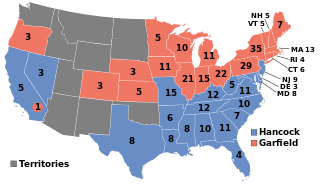
The 1880 United States presidential election was the 24th quadrennial presidential election, held on Tuesday, November 2, 1880, in which Republican nominee James A. Garfield defeated Winfield Scott Hancock of the Democratic Party. The voter turnout rate was one of the highest in the nation's history. Garfield was assassinated during his first year in office, and he was succeeded by his vice president, Chester A. Arthur.
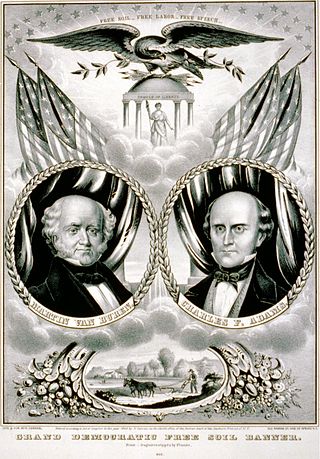
The Free Soil Party was a short-lived coalition political party in the United States active from 1848 to 1854, when it merged into the Republican Party. The party was largely focused on the single issue of opposing the expansion of slavery into the western territories of the United States.
Yellow Dog Democrats is a political term that was applied to voters in the Southern United States who voted solely for candidates who represented the Democratic Party. The term originated in the late 19th century. These voters would allegedly "vote for a yellow dog before they would vote for any Republican". The term is now more generally applied to refer to any Democrat who will vote a straight party ticket under any circumstances. The South Carolina Democratic Party and Mississippi Democratic Party, among other state parties, continue to use the phrase to refer to committed members of the Democratic Party in the "Yellow Dog Club".
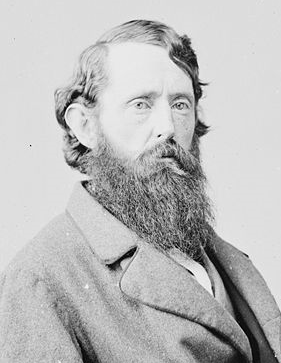
Benjamin Gratz Brown was an American politician. He was a U.S. Senator, the 20th Governor of Missouri, and the Liberal Republican and Democratic Party vice presidential candidate in the presidential election of 1872.
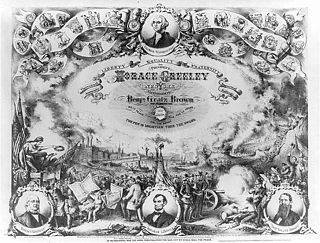
The Liberal Republican Party was an American political party that was organized in May 1872 to oppose the reelection of President Ulysses S. Grant and his Radical Republican supporters in the presidential election of 1872. The party emerged in Missouri under the leadership of Senator Carl Schurz and soon attracted other opponents of Grant; Liberal Republicans decried the scandals of the Grant administration and sought civil service reform. The party opposed Grant's Reconstruction policies, particularly the Enforcement Acts that destroyed the Ku Klux Klan. It lost in a landslide, and disappeared from the national stage after the 1872 election.

The 1876 South Carolina gubernatorial election was held on November 7, 1876 to select the governor of the state of South Carolina. The election campaign was a referendum on the Radical Republican-led state government and their Reconstruction policies. Opponents disputed the challenger Wade Hampton III's victory, gained by a margin of little more than 1100 votes statewide. But he took office in April 1877, after President Hayes withdrew federal troops as a result of a national Democratic compromise, and the incumbent Daniel Henry Chamberlain left the state.

The 1878 South Carolina gubernatorial election was held on November 5, 1878 to select the governor of South Carolina. Wade Hampton III was renominated by the Democrats and ran against no organized opposition in the general election to win reelection for a second two-year term.
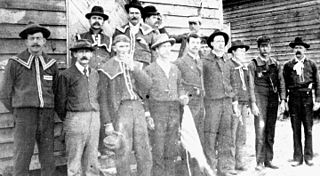
The Red Shirts or Redshirts of the Southern United States were white supremacist paramilitary terrorist groups that were active in the late 19th century in the last years of, and after the end of, the Reconstruction era of the United States. Red Shirt groups originated in Mississippi in 1875, when anti-Reconstruction private terror units adopted red shirts to make themselves more visible and threatening to Southern Republicans, both whites and freedmen. Similar groups in the Carolinas also adopted red shirts.

The 1880 South Carolina gubernatorial election was held on November 2, 1880 to s elect the governor of South Carolina. Johnson Hagood was nominated by the Democrats and ran against L. W. R. Blair, a Greenback-Labor candidate. Hagood easily won the general election and became the 80th governor of South Carolina.
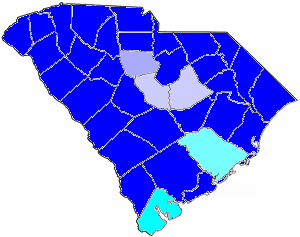
The 1890 South Carolina gubernatorial election was held on Tuesday November 4, to elect the governor of South Carolina. Ben Tillman was nominated by the Democrats and easily won the general election against A.C. Haskell to become the 84th governor of South Carolina.

The 1892 South Carolina gubernatorial election was held on November 8, 1892 to select the governor of the state of South Carolina. Governor Ben Tillman was renominated by the Democrats and was elected in the general election to a second two-year term.

John Quincy Adams II was an American politician who represented Quincy in the Massachusetts House of Representatives from 1866 to 1867, 1868 to 1869, 1871 to 1872, and from 1874 to 1875.
The 1880 Democratic National Convention was held June 22 to 24, 1880, at the Music Hall in Cincinnati, Ohio, and nominated Winfield S. Hancock of Pennsylvania for president and William H. English of Indiana for vice president in the United States presidential election of 1880.

The 1872 Democratic National Convention was a presidential nominating convention held at Ford's Grand Opera House on East Fayette Street, between North Howard and North Eutaw Streets, in Baltimore, Maryland on July 9 and 10, 1872. It resulted in the nomination of newspaper publisher Horace Greeley of New York and Governor Benjamin Gratz Brown of Missouri for president and vice president, a ticket previously nominated by the rump Liberal Republican faction convention meeting, also held in Baltimore's newly built premier Opera House of nationally well-known theatre owner/operator John T. Ford of the major Republican Party, which had already re-nominated incumbent President Ulysses S. Grant of the regular Republicans for another term.

In 1872, Horace Greeley ran unsuccessfully for President of the United States. He served as the candidate of both the Democrats and the Liberal Republicans, in the 1872 election. In the run-up to the 1872 United States presidential election, major changes occurred in the United States. Specifically, the 15th Amendment gave African-Americans the right to vote for the first time, while the government cracked down on the Ku Klux Klan. In addition, the economy was still in good shape and President Ulysses S. Grant's corruption scandals for the most part were still not public knowledge. With this background, the incumbent U.S. President was able to decisively defeat Greeley.

The Delaware Straight-Out Truth Teller was an American semi-monthly newspaper based in Wilmington, Delaware. It was founded in 1872 by William Dean and John A. Brown in response to political dissension in relation to the United States presidential election of that year. The paper supported the Straight-Out Democratic Party presidential candidate Charles O'Conor and was a strong opposer of Liberal Republican Party candidate Horace Greeley. Its motto was "O'Conor & Adams; Honesty, Patriotism and Statesmanship." The paper appears to have ceased publishing after the election ended.
References
- ↑ Chronicler (pseudonym) (3 December 2008). "US President - Straight-Out Democratic Convention". Our Campaigns. Archived from the original on 6 October 2017. Retrieved 7 October 2017.
- ↑ J. Q. Adams (October 3, 1872). "Letter to William C. Moreau, Chairman of a Committee of the Convention at Louisville". New York Times. p. 5. Archived from the original on July 5, 2021. Retrieved October 25, 2017.
- ↑ Leip, Dave. "1872 Presidential General Election Result, Atlas of U. S. Presidential Elections". Archived from the original on 22 February 2011. Retrieved 7 October 2017.
- ↑ "About Delaware straight-out truth teller. ([Wilmington, Del.]) 1872-18??". Chronicling America . Library of Congress.
- ↑ Library of Congress. "Chronicling America. Historic American Newspapers". Archived from the original on 6 October 2017. Retrieved 7 October 2017.